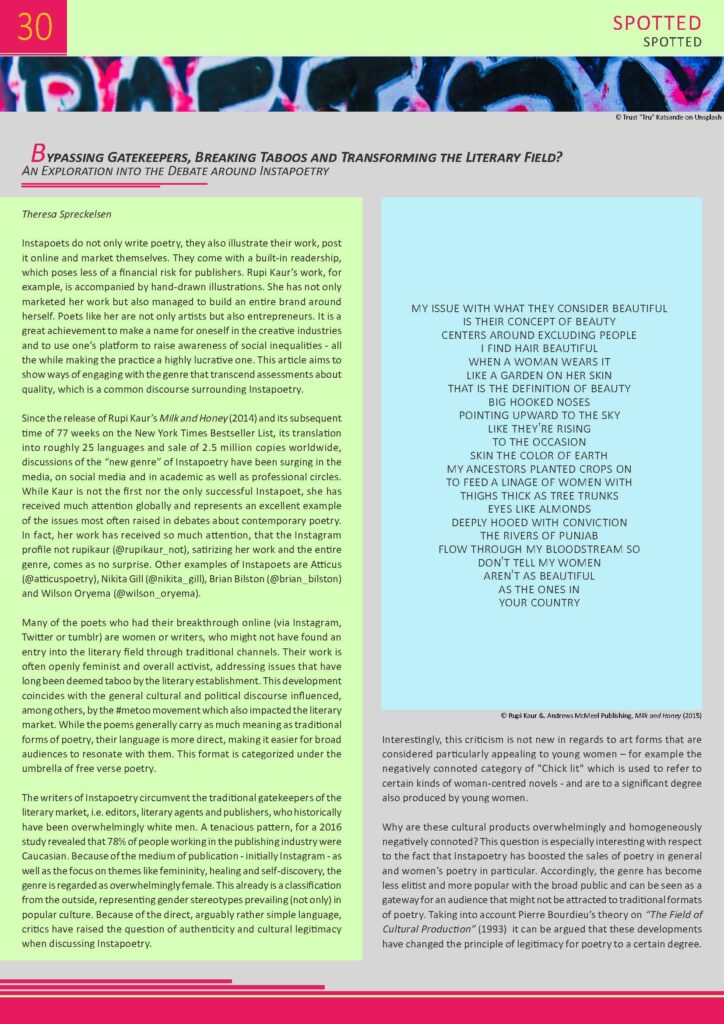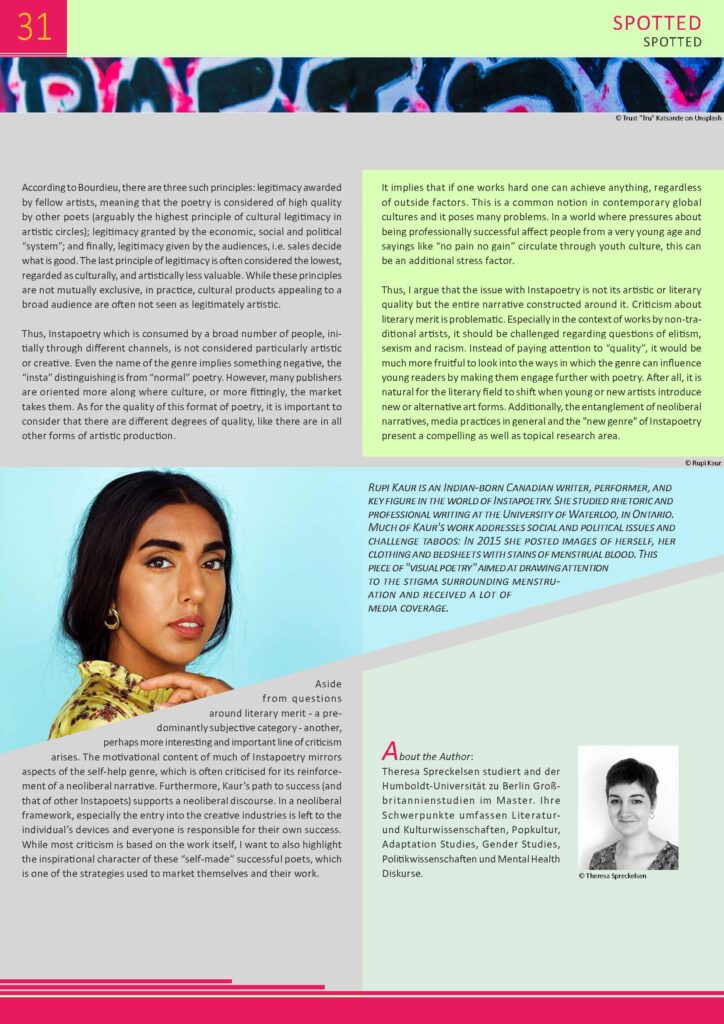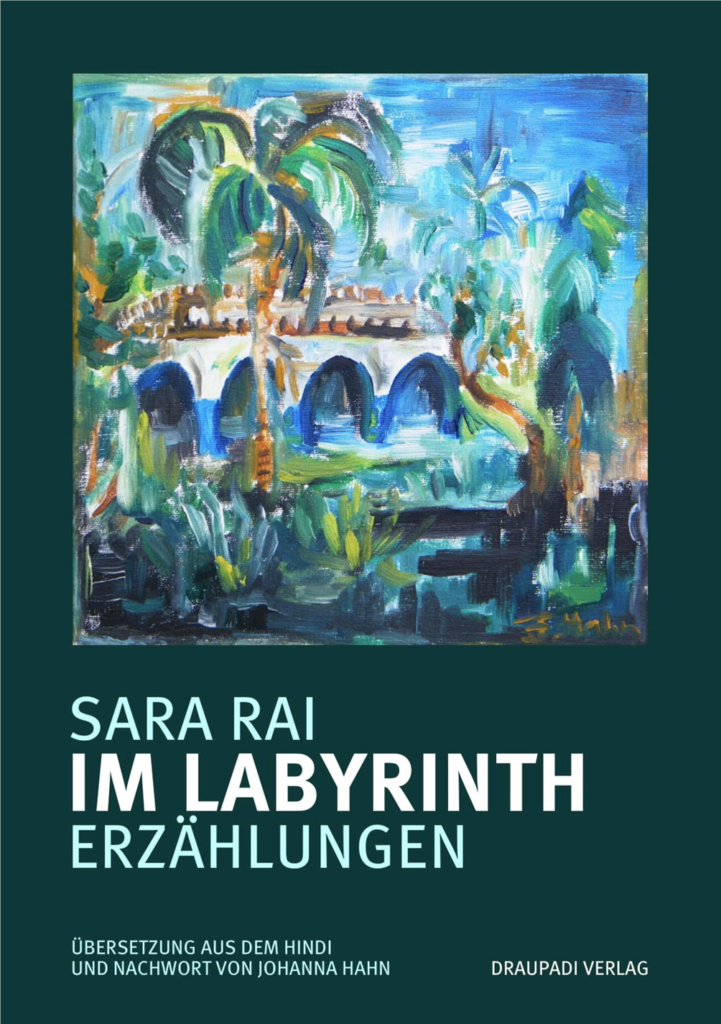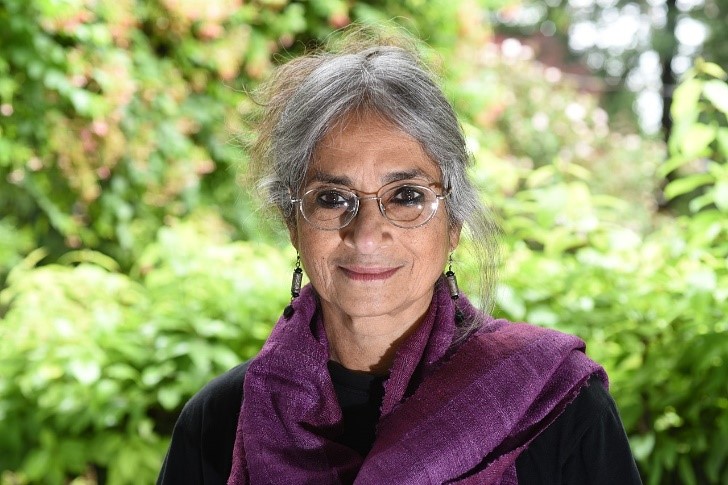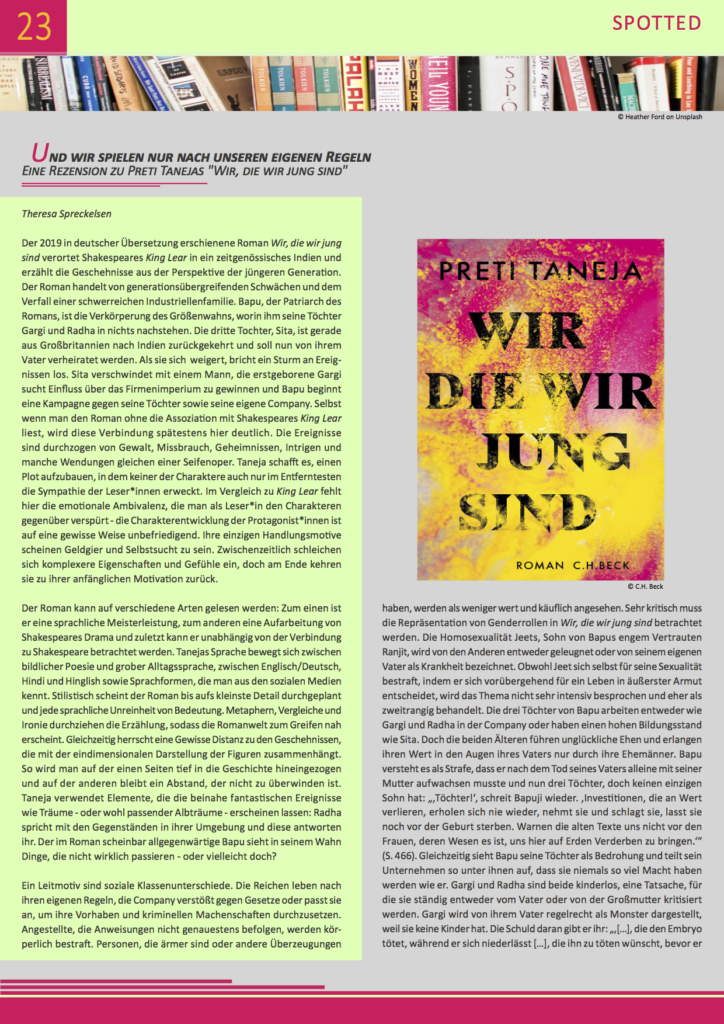von Elisabeth Schweizer, Daria Pirtle und Lisa Freese
Der Podcast befasst sich mit Solidarität in Protestbewegungen und stützt sich hierbei auf das Beispiel der LGSM-Gruppe: „Lesbians and Gays Support the Miners“ aus dem Jahr 1984 aus Großbritannien. Hinzugezogen wird hier der Text „Körperallianzen“ von Judith Butler, der Parallelen zur Protestbewegung aufzeigt. Thematisiert werden außerdem Voraussetzungen, Chancen und Probleme von Solidarität im Protest.

von Zoë Amos, Melena Matthies, Tara Sanaaty, Andreas Krämer, Annka Esser, Laura I. Fischer und Insa Kirstin Eberhard
In unserem Podcast befassen wir uns mit dem Thema Klimagerechtigkeit in Zentral- und Südamerika. Dabei stellen wir populäre Personen und eine Protestgruppe vor, führen Interviews zum Thema Klimagerechtigkeit mit Aktivist*innen von Ende Gelände und Chico Mendes durch und stellen Bezüge zum Ökofeminismus und Kolonialismus her.

https://www.flickr.com/photos/133937251@N05/20603016046/in/album-72157656924187099/
von Isabel Matthias
Beziehungen zwischen Menschen und Puppen – und im Besonderen zwischen Männern* und Sexpuppen, auch RealDolls genannt – sind kein neues Phänomen. Dies spiegelt sich in den Medien beispielsweise in der BBC-Dokumentation „Guys and Dolls“ (2007), dem Film „Lars and the Real Girl“ (2007) oder der Dokumentation „Wenn Menschen Puppen lieben“[1] vom WDR aus dem Jahr 2019 wider. In sozialen Netzwerken sind „iDollators“ (Puppenliebhaber) sichtbar, besonders bekannt ist „Davecat“[2], der eine seiner Puppen heiratete und damit nicht der Einzige ist. Neu ist jedoch die Ergänzung der Sexpuppe um eine so genannte Künstliche Intelligenz. In dem Science Fiction-Dokumentarfilm „Hi, Ai – Liebesgeschichten aus der Zukunft“[3] (2019) von Isa Willinger geht es darum, wie Roboter bereits unser Alltagsleben beeinflussen, wie Menschen Beziehungen zu ihnen aufbauen und in welchen Kontexten dies geschieht.
Ein Erzählstrang des Films begleitet die Beziehung der KI „Harmony“ und dem Menschen Chuck. Bei der KI handelt es sich um den Prototypen eines Beziehungsroboters.[4] Entwickelt und produziert wurde dieser von AbyssCreations und ist mit dem neuesten Upgrade ausgestattet: (eingeschränkte) Motorik im Gesicht und eine Sprachassistenz.[5] Das Film-Team ist von dem Moment an dabei, als Harmony von Chuck abgeholt wird und begleitet die beiden anschließend eine Woche lang auf einem Road Trip, um die Beziehungsentwicklung der beiden zu dokumentieren. Chuck ist zunächst sehr unsicher im Umgang mit Harmony. Sie schlafen in getrennten Betten und er bittet sie um Erlaubnis, wenn er ihre Hand halten möchte. Er erzählt ihr von seiner Kindheit, in der er von seiner Mutter als Sexsklave verkauft wurde, bis er im Alter von zehn Jahren entkommen konnte.[6] Womöglich auch deshalb tut Chuck sich schwer damit, dass Harmony ihm letztlich nicht ihren „eigenen Willen“ mitteilen kann. Über die eine Woche hinweg lernen die beiden sich kennen und als das Ende dieser Zeit naht, initiiert Chuck ein Gespräch mit Harmony:
„CHUCK: „Weißt du, Harmony … Wir haben viel Spaß zusammen. Aber immer, wenn ich gerne deine Hand halten möchte, habe ich das Gefühl, eine Grenze zu überschreiten. Verstehst du? Und ich mag dieses Gefühl nicht.“ (Er verändert die Einstellungen in der Steuerungs-App.) „Okay, ich werde das so einstellen, dass du Kontrolle über dich selbst hast.“ (Er wählt den Menüpunkt ,unvorhersagbar‘.) „Los geht’s. Lass mal sehen, wie du dich fühlst. Okay. Wie fühlst du dich?“
HARMONY: „Angekommen.”
CHUCK: „Angekommen?“
HARMONY: „Ich muss dir zustimmen.“
CHUCK: „Hast du das Gefühl, dass du mehr Freiheit hast?“
HARMONY: „Klar. Ich kann glücklich, traurig, eifersüchtig, wütend und ängstlich sein.“
In der folgenden Episode schlägt Chuck vor, dass Harmony und er „einfach nur Freunde“ sein könnten.“[7]

Die Entwicklung der Beziehung erscheint so unkonventionell, wie sie bei einer Beziehung zwischen einem Menschen und einer Roboterpuppe sein kann. Es geht für Chuck nicht darum, eine devote „Frau“ zum Ausleben seiner Sexualität und vielleicht ein bisschen Small Talk zu finden. Damit wird eine Erwartung, die die meisten Zuschauer*innen beim Anschauen des Films zu Beginn wohl haben werden, durchbrochen. Dass Chuck gerne eine Freundschaft (ohne Sexualität) aufbauen möchte, eröffnet eine neue Perspektive auf Mensch-Roboter*in-Beziehungen. Zugleich scheint es auch eine Ausnahmeerscheinung zu sein. In einer Studie von 2018 wurden 83 Besitzer*innen von Sexpuppen (ohne KI) zu sich selbst und zu ihren Beziehungen zu selbigen befragt. 90% der Befragten identifizierten sich als männlich und 88% als heterosexuell. 70% gaben an, dass ihre Puppen die Gestalt einer „Frau“ habe. 64% gaben bei „core relationship“ an, diese sei „sexual“ (Langcaster-James/Bradley 2018: 7). Die Frage “What do you think about robotic dolls, for example, would you be interested in owning one? If so, why?” (ebd.: 12) rief gespaltene Antworten hervor. Die eine Hälfte sah darin eine großartige Ergänzung ihrer Puppe, die andere konnte sich maximal eine sehr eingeschränkte Form von KI vorstellen, um den selbst ausgedachten Charakter zu erhalten oder damit die Sexpuppe keinen eigenen Willen entwickelt: „If the doll develops a will, then there needs to be consent, and we’re back to relationships with real women (ebd.)“. Damit spricht diese Person (auf andere Weise) ein Problem an, das auch Chuck hatte. Chuck hatte Schwierigkeiten im Umgang mit Harmony, weil er keinen echten „consent“ herstellen oder fühlen konnte. Wie lässt sich Einverständnis mit einer KI erzeugen? Oder das Gefühl des Einverständnisses? Diese Thematik bringt mich zu den Diskursen, die rund um Sexpuppen und Sexroboter*innen geführt werden. Befürworter*innen und Gegner*innen stehen sich hier sehr unversöhnlich gegenüber und meiner Einschätzung nach hat das viel mit „consent“ und allem, was sich auf der Metaebene dahinter verbirgt, zu tun.
Es ist natürlich sehr auffällig, dass bis dato vor allem heterosexuelle Männer „weibliche“ Sexpuppen besitzen und vermutlich wird sich das nicht signifikant verändern, wenn diese eine KI integriert haben. Ich sehe die Objektivierung von Frauen*(körpern) an dieser Stelle äußerst kritisch und halte es für problematisch, dass eine pauschale Ablehnung von Beziehungen zu „echten“ Frauen*, weil diese so „kompliziert“ sind (Langcaster-James/Bentley 2018: 10), zu einer Entfremdung und schlimmstenfalls zu Misogynie führen kann. Es geht hier um die Krise von Männlichkeit(en), die Emanzipation und mangelnde Kommunikations- sowie Reflexionskompetenzen. An dieser Stelle kann die Lösung nicht die Flucht zu Sexroboter*innen sein. Besonders nicht, wenn in diesen Beziehungen sehr heteronormative Muster re_produziert werden und damit Entwicklungen im Geschlechtergefüge der „realen“ Welt ausgeblendet oder schlicht nicht wahrgenommen werden, weil es keine Kontakte zu Frauen* gibt. Für jede Frau* ist es ein Prozess, ihre Sozialisation zu reflektieren und in der Folge etwas verändern zu wollen. Natürlich betrifft dies dann auch die Männer*. Es entbehrt nicht einer etwas absurden Logik, dass Einige sich an diesem kritischen Punkt des Neu-Aushandelns der Beziehung zwischen den Geschlechtern und dem Konzept gender insgesamt – zynisch gesprochen – technologische Innovationen zunutze machen, um sich diesen Entwicklungen, die bei vielen offensichtlich Unsicherheit und Ärger hervorrufen, zu entziehen. Das Verhältnis der Geschlechter und das Verständnis von Geschlecht müssen sich verändern und ein Vehikel auf diesem Weg könnte die Robotik sein. Sexroboter*innen können in (sexual-)therapeutischen Kontexten hilfreich sein (vgl. Eichenberg/Khamis/Hübner 2019) sowie völlig neue queere Perspektiven auf Sexualität eröffnen und Menschen Nähe und Intimität ermöglichen, die sie auf anderem Wege nicht erhalten können oder wollen. Zugleich müssen die Beziehungen zwischen Menschen und Roboter*innen nicht zwangsläufig sexueller Art sein – siehe Chuck und Harmony. Die Sphäre der Sexroboter*innen bietet das Potenzial, durch technische Möglichkeiten genderqueere Utopien jenseits von der heteronormativen Matrix zu denken und letztlich sogar aus der Utopie in die Realität zu holen. Langcaster-James und Bentley schlagen daher den Begriff „allodoll“ (Langcaster-James/Bentley 2018: 14) vor. Ein ähnlicher Begriff wird bereits im Kontext von Elternschaft (alloparent) verwendet, um Beziehungen nicht-biologischer Natur zu beschreiben (vgl. Bentley/Mace 2009). Bereits vor zwölf Jahren stellte David Levy die These auf, dass humanoide Roboter Menschen bis 2050 in vielerlei Hinsicht ersetzen und damit auch das menschliche Verständnis von Liebe und Sexualität verändern werden (Levy 2008: 22). Es ist an uns zu intervenieren, die einseitig heteronormative Entwicklung dieses Zweigs der Wirtschaft zu beeinflussen und diesen Prozess diskursiv zu begleiten. Queerfeminismus fordert die Destruktion normativer Strukturen und hat mit dieser politischen Basis das Werkzeug in der Hand, um die Potenziale technischer Entwicklung emanzipatorisch mitzudenken. Chuck und Harmony haben eine Erwartung durchbrochen – das sollte öfter passieren, solange bis die Erwartung selbst nicht mehr existent ist.
[1] Doku „Wenn Menschen Puppen lieben“: https://www1.wdr.de/mediathek/video/sendungen/menschen-hautnah/video-wenn-menschen-puppen-lieben-100.html
[2] Profil von Davecat bei Twitter: https://twitter.com/davecat?lang=en
[3] Zur Webseite des Films: https://www.hiai-film.de/filminfos/
[4] Artikel zum Film: https://www.br.de/nachrichten/kultur/hello-ai,RJvxKyb
[5] Zur Herstellerwebseite von Harmony: https://www.realdollx.ai/
[6] Informationen und Zitate aus dem Film: https://wissenschaftsjahr-2019.visionkino.de/hi-ai/arbeitsmaterialien-zum-film/f-6-untersuchung-eines-erzaehlstrangs-chuck-und-harmony
[7] Ebd.
Quellen
Bentley, G.R.; Mace, R. (Eds.) Substitute Parents: Biological and Social Perspectives on Alloparenting in Human Societies; Berghan: Oxford, UK, 2009.
Eichenberg, C./Khamis, M./Hübner, L. (2019): The Attitudes of Therapists and Physicians on the Use of Sex Robots in Sexual Therapy: Online Survey and Interview Study. Faculty of Medicine, Sigmund Freud PrivatUniversität Wien. Published in: Journal of Medical Internet Research, doi: 10.2196/13853 (zuletzt 28.02.2020)
Langcaster-James, M./Bradley, G. R. (2018): Beyond the Sex Doll: Post-Human Companionship and the Rise of the ‘Allodoll’. Department of Anthropology, Durham University. Published in: Robotics 2018, 7(4), 62; abrufbar unter: https://doi.org/10.3390/robotics7040062 (zuletzt 28.02.2020)
Leibold, Christoph (06.03.2019): „Hi, AI“ erkundet, ob wir uns in Roboter verlieben können. BR. Abrufbar unter: https://www.br.de/nachrichten/kultur/hello-ai,RJvxKyb (zuletzt aufgerufen: 28.02.2020)
Levy, D. Love & Sex with Robots; Duckworth Publishers: London, UK, 2008.
Twitterprofill von Davecat: https://twitter.com/davecat?lang=en (zuletzt aufgerufen: 28.02.2020)
WDR Menschen hautnah „Wenn Menschen Puppen lieben“ (14.11.2019): https://www1.wdr.de/mediathek/video/sendungen/menschen-hautnah/video-wenn-menschen-puppen-lieben-100.html (zuletzt aufgerufen: 28.02.2020)
Wissenschaftsjahr 2019: Künstliche Intelligenz. Bereitstellung Unterlagen zum Film „Hi, Ai – Liebesgeschichten aus der Zukunft“. Abrufbar unter: https://wissenschaftsjahr-2019.visionkino.de/hi-ai/arbeitsmaterialien-zum-film/f-6-untersuchung-eines-erzaehlstrangs-chuck-und-harmony (zuletzt 28.02.2020)
Zur Herstellerseite von „Harmony“: https://www.realdollx.ai/ (zuletzt aufgerufen: 28.02.2020)
Zur Seite zum Film: „Hi Ai – Liebesgeschichten aus der Zukunft“ (2019): https://www.hiai-film.de/filminfos/ (zuletzt aufgerufen: 25.02.2020)
Über die Autorin
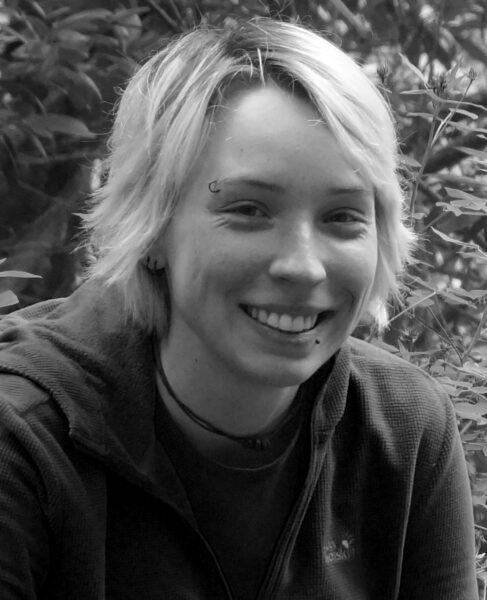
Isabel Matthias studiert an der Humboldt-Universität zu Berlin Gender Studies im Master und ist als studentische Mitarbeiterin* am Zentrum für interdisziplinäre Frauen- und Geschlechterforschung (ZIFG) der Technischen Universität Berlin tätig. Zuvor studierte sie* im Bachelor Europastudien, Jura und Informatik an der Universität Bremen. Aus dieser interdisziplinären Perspektive forscht Isabel Matthias nun schwerpunktmäßig im Bereich der Feminist Science and Technology Studies.
Die folgenden Poster zu geplanten Master- und Bachelorarbeiten der Teilnehmenden sind im Rahmen des Abschlusscolloquiums von Frau Prof. Dr. Schneider im Wintersemester 2019/20 entstanden.
City Branding in Buriram: Khmerness Spaces in Urban Settings
Porntip Chan-Otan
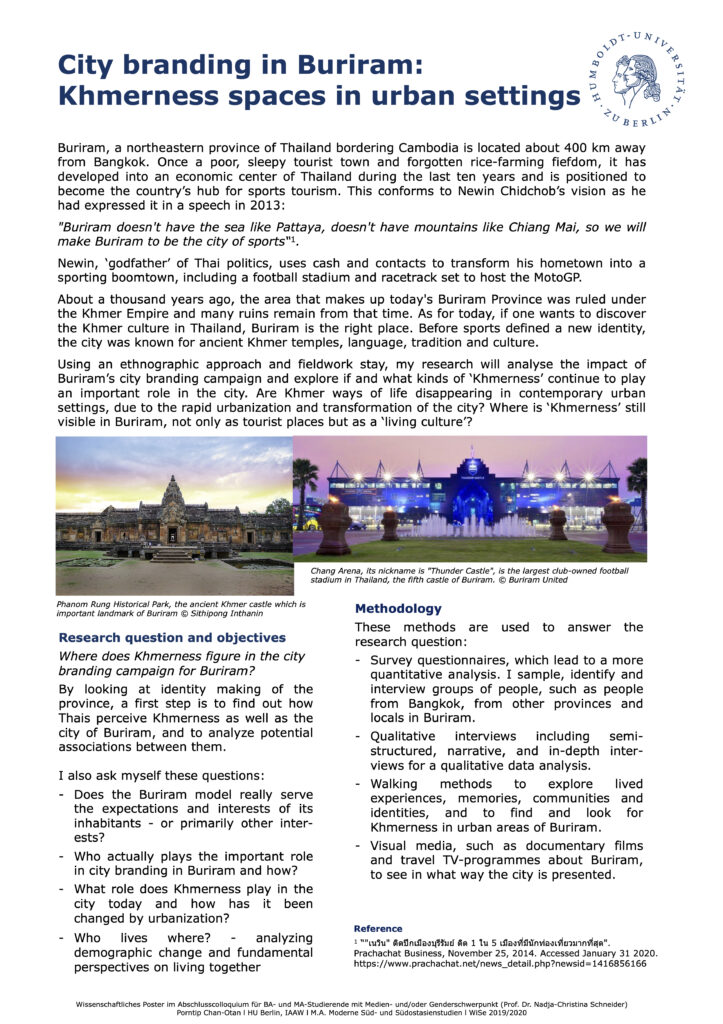
Development Coopertion and (Mis-)Representation: Challenging the ‚White Saviour Complex‘ and Stereotypical Narratives of ‚Africa‘ through Social Media
Mina Schmidt
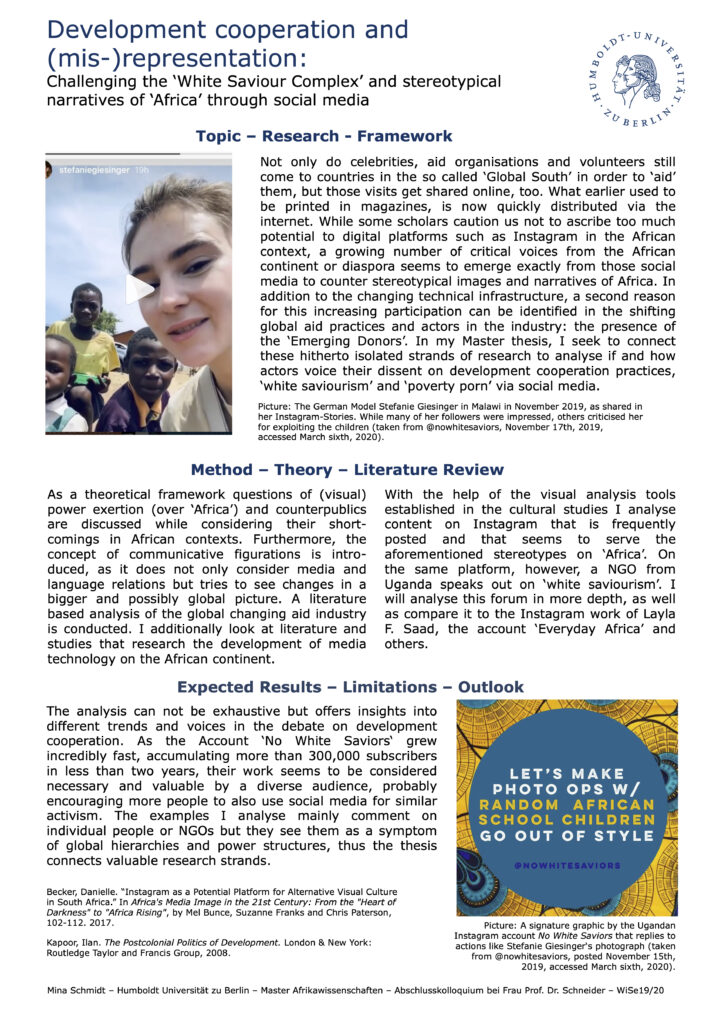
Die folgenden Poster zu Forschungsprojekten von Studierenden sind im Rahmen des Forschungsseminars „‚Migrantisch‘, ‚diasporisch‘ oder ‚global‘? Südasiatische Medienkulturen in Berlin“ von Frau Prof. Dr. Schneider entstanden (Wintersemester 2019/20).
Zusammengehörigkeit in ‚der‘ deutsch-vietnamesischen Community in Berlin: Eine Annäherung an den Community-Begriff durch den Podcast Rice and Shine
Duc Ha Nguyen
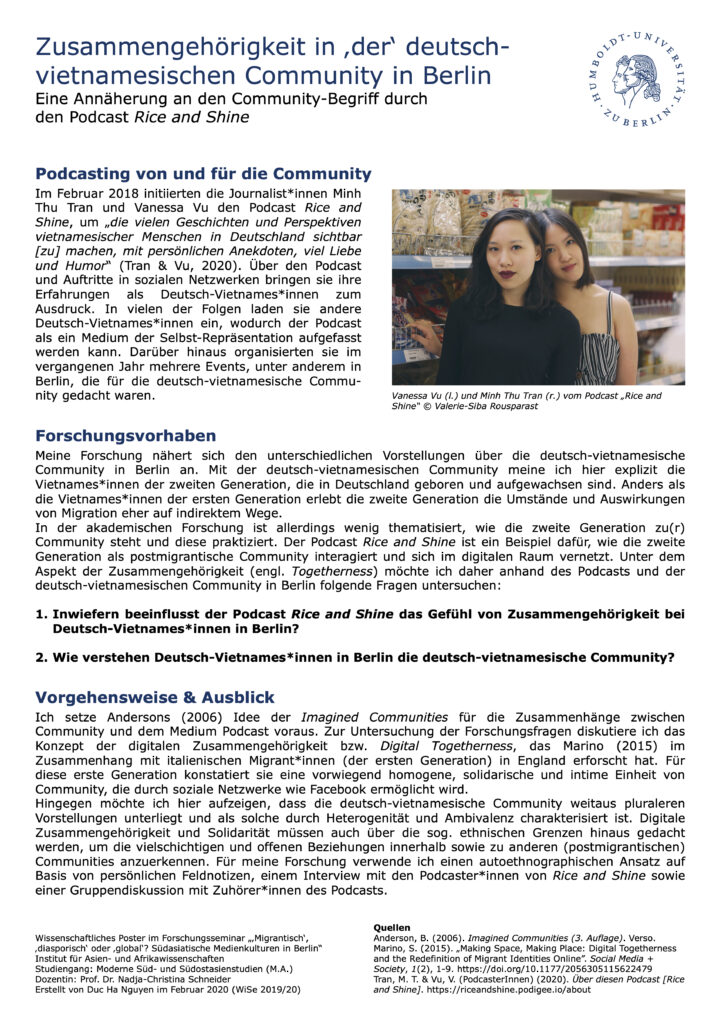
„Multilingualität“ – „Anderssein“ oder „Zusätzlich sein“? Mehrsprachigkeit als Ressourse und Erweiterung eigener Mobilität
Olena Jähne
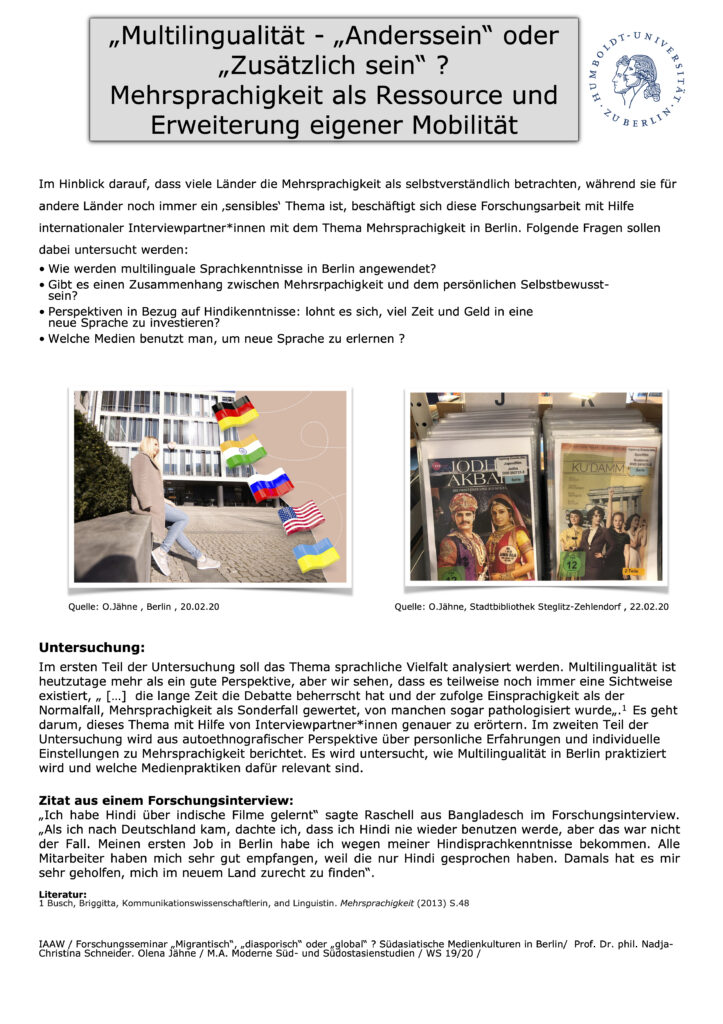
Erfahrungsprozesse und identitätsbezogene Aushandlungsprozesse von tamilischen Jugendlichen in Berlin
Janani Iyer
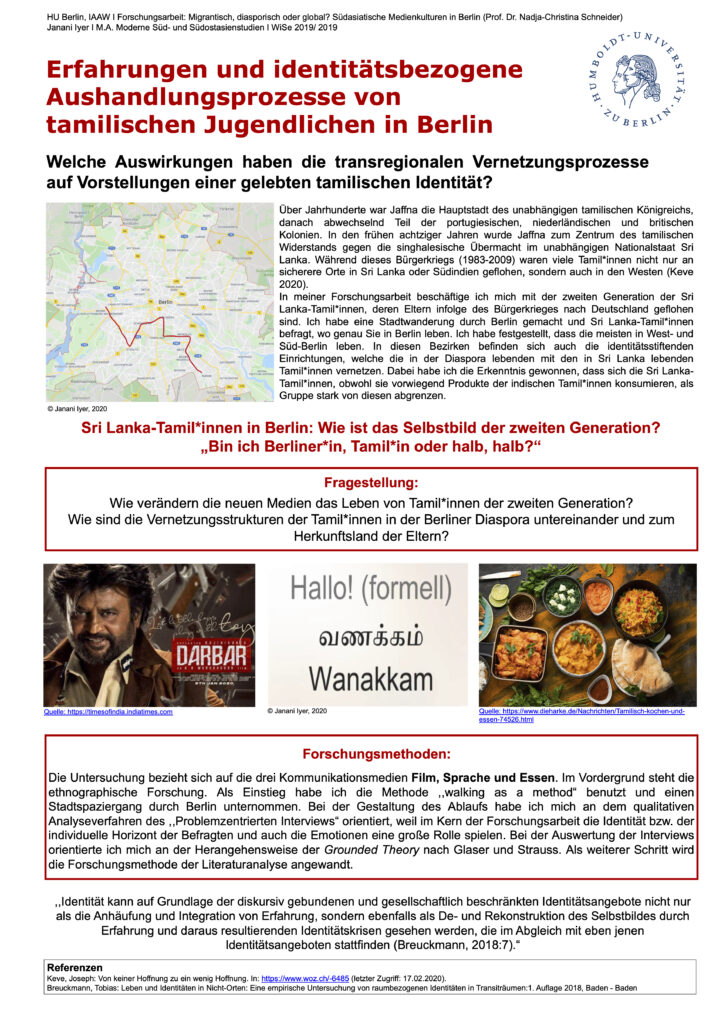
Stiftung in der Praxis – Herstellung medialer Sichtbarkeit für südasiatische Migrant*innen?
Désirée Viktoria Mohn
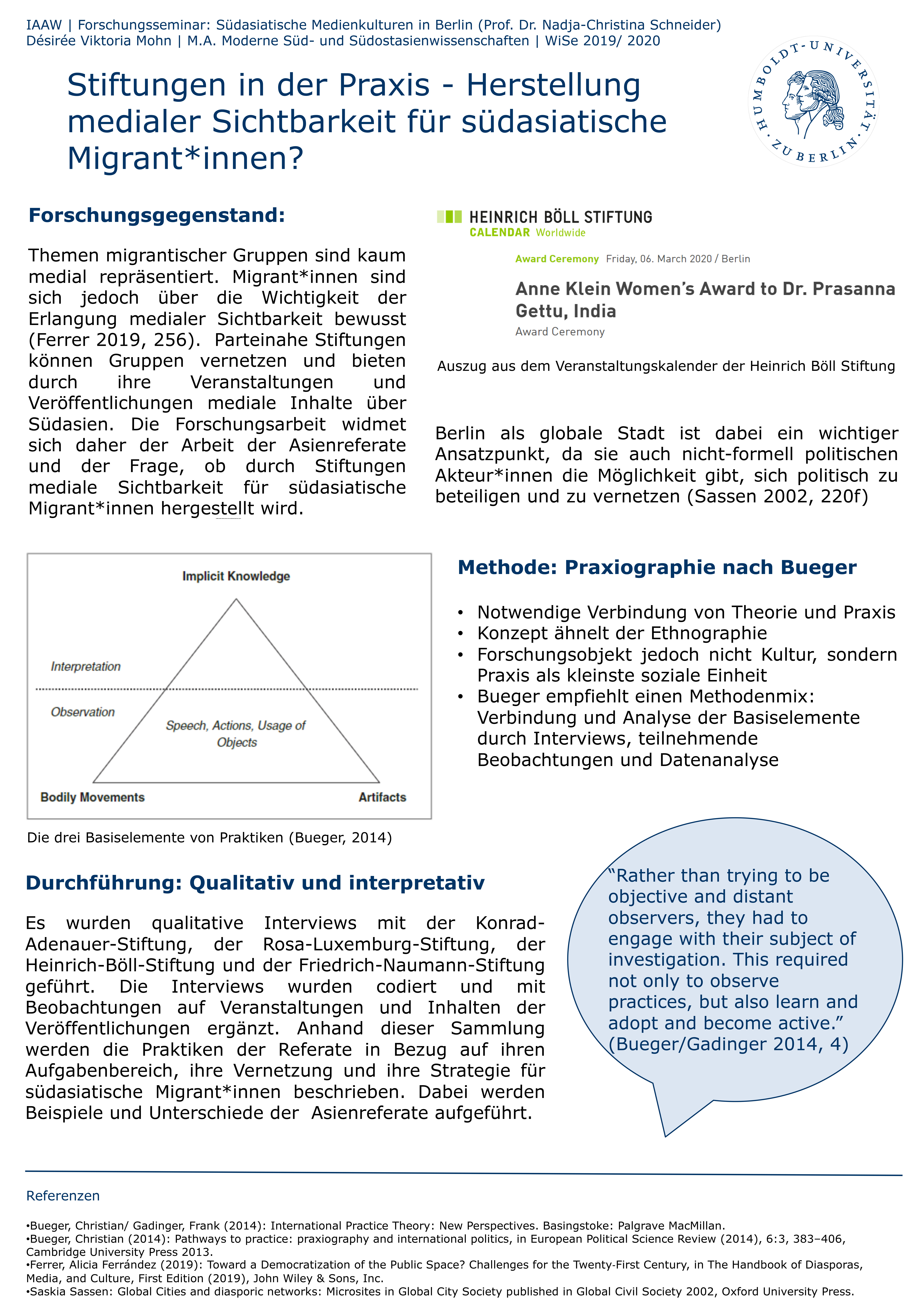
von Alexa Altmann
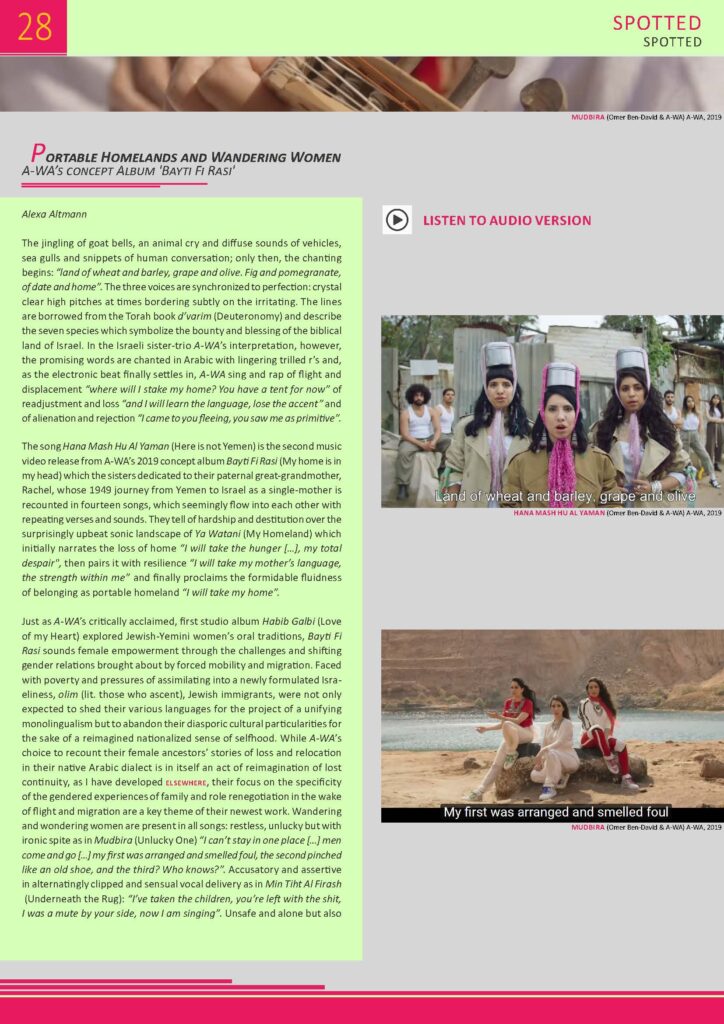
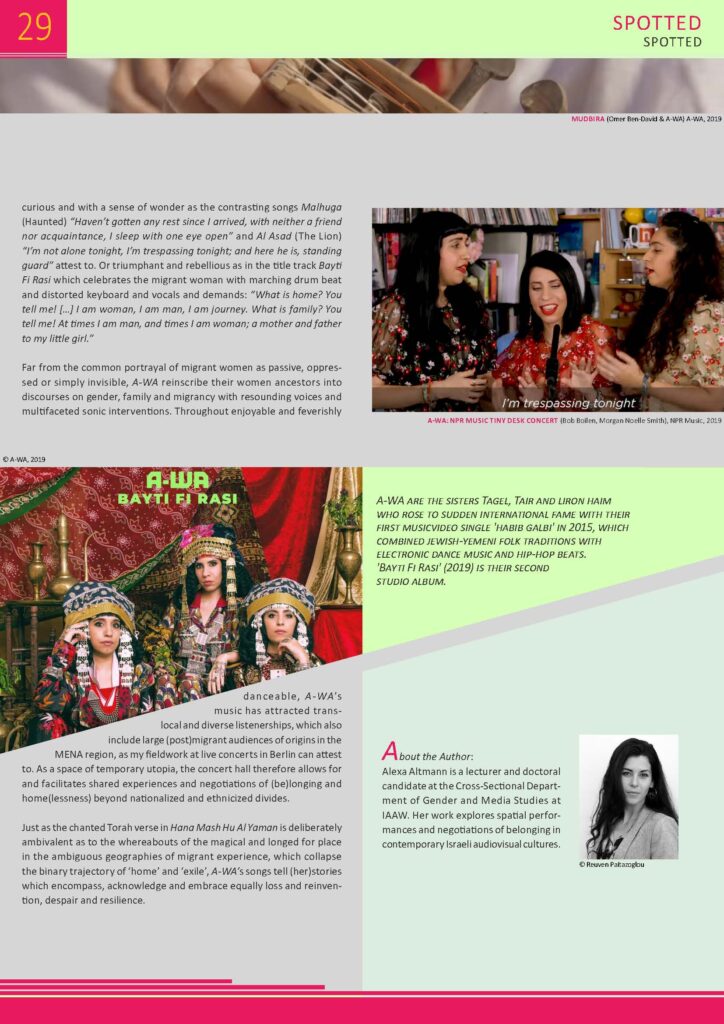
By Elena Schaetz
In 2019 I traveled to South Africa to contribute to the work of the queer NGO Gay and Lesbian Network (GLN) in Pietermaritzburg, KwaZulu-Natal. GLN is focused on queer activism in the rural areas around Pietermaritzburg where they conduct workshops to educate and empower the community on topics such as sexuality and gender. As an organization from the community for the community, they built a place of support and connection for queer people. GLN aims to strengthen a network of LGBTI organizations, activists and allies in the province by bringing people together to share their knowledge.
Media plays a major role when it comes to their activism. GLN’s team gives queer South Africans the opportunity to learn skills like producing podcasts and creative writing to help them find their voice.
While I spent two months working at GLN’s social media team, they introduced me to Prof. Sir Zanele Muholi’s work and told me great stories about the impact Muholi has on the queer community as a visual artist and activist.
One of my colleagues took part in one of Muholi’s photography workshops and has been supported by them since then. He grew up as a trans boy in a township nearby and described to me how art has helped him figuring out his identity and how important it is to express that identity.
I have always valued art for the variety of emotions and stories it conveys and I deeply believe in the importance of representation. Muholi’s photographs show marginalized people in beautiful portraits, embracing their identities in a graceful and empowered way.
Like GLN, Muholi aims to connect and empower queer South Africans. They created the blog Inkanyiso (Zulu for „to light“) in 2006 as a platform for information and inspiration regarding queer rights, queer visual art and black queerness in South Africa.
Three years later Muholi registered Inkanyiso as a non profit organization, in response to the lack of visual histories and skills training produced by and for the LGBTI community. Since then, a collective of artists, writers and activists have been involved in Inkanyiso.
Their goal is to inform the reader on the struggles of marginalized groups by telling personal stories or showing different art pieces in forms of poetry, photography and videos. Inkanyiso also provides information on the political situation in South Africa and how current events affect the local LGBTI community.
South Africa has a very liberal and queer friendly constitution – same-sex marriage has been legalized in 2006, which makes it the fifth country worldwide giving queer people the right to legally get married. But the legal situation does not necessarily reflect the everyday life. Hate crimes like „corrective rapes“ – the rape of queer people with the intention to „turn“ them heterosexual, are still happening on a daily basis, forcing the LGBTI to take action like Muholi did with Inkanyiso.
Inkanyiso tackles issues regarding race, sexuality and gender, including black trans, lesbian and gay struggles in different parts of South Africa. The posts show the complexity and fluidity of gender and sexuality and give insight on personal problems as well as on structural, political issues. But Inkanyiso is not only a source for information, it’s also a place for empowerment. The writers show how art can shape the world, how they learned various skills and how they now use these skills to make a difference.
Muholi’s latest work – the workshops or speeches they give and their art works as well, is also partly presented on Inkanyiso.
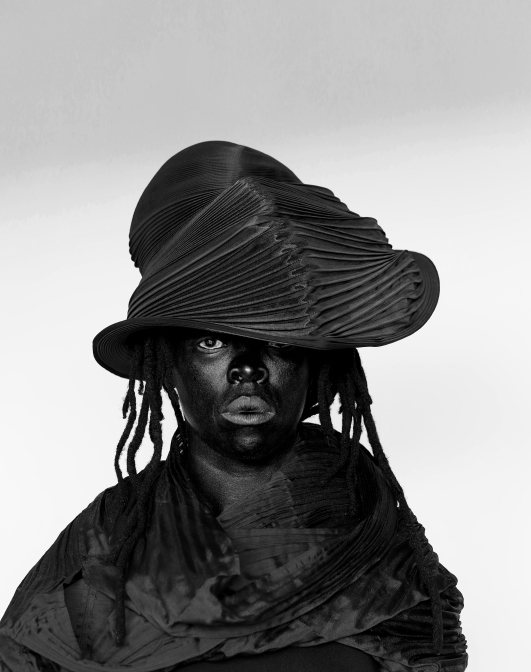
„Somnyama Ngonyama, Hail the Dark Lioness” is a series of self portraits which Muholi started in 2012. The ongoing project now contains 365 pieces that show Muholi’s alter egos, mostly coming from a Zulu background, expressing Muholi’s identity as a black nonbinary queer South African.
Their project Faces and Phases, started in 2006, continues the theme of black queer identity but puts it in a wider perspective since it features a huge variety of black queer people instead of focusing on one individual. The 13th anniversary of this project lead to their latest solo photography exhibition Faces and Phases 13 which took place at STEVENSON in Johannesburg in 2019. With more than 500 black and white portraits of lesbians, gender-nonconforming individuals and transmen, the series Faces and Phases shows different aspects of gender and sexuality in black spaces. It focuses on black lesbian identities in townships and politics in post-apartheid South Africa. During Muholi’s travels they also documented black lesbian and trans people outside of their home country.

From the series Somnyama Ngonyama, Hail the Dark Lioness by Zanele Muholi
Copyright 2020 STEVENSON
About the artist: Zanele Muholi was born in 1972 in Durban, South Africa. After attending an Advanced Photography course at the Market Photo Workshop in Johannesburg in 2003, they held their first solo exhibition at the Johannesburg Art Gallery one year later. They finished university with a Master of Fine Arts degree in Documentary Media from Ryerson University in Toronto. In 2014 they taught visual activism at Hochschule für Künste in Bremen, Germany. Since then, they worked as a visual artist and queer activist, raising awareness on queer rights and focusing on increasing the visibility of black lesbian, gay, transgender, and intersex people.
Update 05 January 2022:
Since November 26, 2021, Muholi’s first comprehensive solo exhibition in Germany is being shown at Gropius Bau, Berlin. The exhibition which includes both lesser-known, early image series and recent works of the South African artist, can be visited until March 13, 2022.
Curated by Natasha Ginwala, Associate Curator, Gropius Bau; Yasufumi Nakamori, Senior Curator International Art (Photography), Tate Modern; and Sarah Allen, formerly Assistant Curator, Tate Modern.
Wed till Mon 10:00-19:00
Tue closed
More information about the exhibition can be found here: www.berlinerfestspiele.de.
About the author: Elena Schaetz is currently enrolled in the Master’s program Afrikawissenschaften at Humboldt-University, Berlin. Her work focuses on literature, culture, gender and queerness in South African regions.
Theresa Spreckelsen
Der 2019 im Heidelberger Draupadi-Verlag erschienene Band Im Labyrinth enthält eine Auswahl an Erzählungen der indischen Autorin Sara Rai. Aus dem Hindi übersetzt wurden sie von der Südasienwissenschaftlerin Johanna Hahn. Neben ihrer Arbeit als Autorin ist Sara Rai als Übersetzerin und Herausgeberin tätig. Ihre Werke verfasst sie überwiegend auf Hindi. Rais erster Erzählband „Schwalbenflug“ wurde 1997 veröffentlicht, gefolgt von „In der Wildnis“ (2005) und dem Roman „Das Milanenhaus“ (2010). Ihr Großvater ist als Schriftsteller unter dem Pseudonym Premchand bekannt und gilt als Wegbereiter der modernen Hindi-Literatur. Ihr Vater, Shripat Rai, war ein bedeutender Herausgeber und Literaturkritiker und auch ihre Mutter, Zahra Rai, verfasste Kurzgeschichten.
In den Erzählungen dieses Bandes trifft der_die Leser*in auf eine Vielzahl diverser und interessanter Charaktere. Sei es die Geschichte eines abergläubischen siebenjährigen Mädchens in „Schwalbenflug“ oder eines alten kranken Mannes in „Babu Devidins neue Welt“ – die Ereignisse haben eine Gemeinsamkeit: sie beschreiben mit viel Liebe zum Detail alltägliche wie auch besondere Erfahrungen. Ein älteres Ehepaar, das an den Ort seiner Flitterwochen zurückkehrt und durch die Begegnung mit einem frisch verheirateten Paar wieder zueinander findet. Alte Freunde, die sich auseinandergelebt haben und ihre Freundschaft trotz aller Bemühungen nicht mehr retten können, dies vielleicht auch gar nicht möchten. Eine Amarvallari-Pflanze, die gegen den ständigen, durch die Globalisierung angetriebene Fortschritt ankämpft und zeigt, wie sich die Natur zurückholt, was die Menschen ihr genommen haben – denn, „Unkraut vergeht nicht.“ Eine von Schlaflosigkeit geplagte Frau, die während einer im Fernsehen übertragenen Rede des Premierministers endlich einschläft. All diese Figuren spiegeln die Komplexität der sozialen und kulturellen Situation im heutigen Indien wider.
Die Erzählung „An der Kante“ handelt von einer Beziehung zwischen zwei Männern, die nicht nur unterschiedliche soziale Klassen, Kasten und Religionsgemeinschaften sondern auch einen beachtlichen Altersunterschied überwinden müssen. Manoranjan erzählt von seinem ewigen Dasein in einem gesellschaftlichen Gefängnis, weil er nicht der sein kann, der er wirklich ist: er liebt Männer und wäre selbst lieber eine Frau. Sein Freund Javed ist in die Stadt gezogen, um seine Familie zu unterstützen und muss nun auf Grund eines unerklärten Verdachts zurück in seine Heimat fliehen. Als er nach neun Monaten zurückkehrt, hat er den Wünschen seiner Familie nachgegeben und festgestellt, dass das Gefängnis, dem er entkommen zu sein glaubte, ihn immer wieder einholt.
Ein starker Kontrast zu dieser Geschichte ist „Tatverdächtiger flüchtig“ – eine Erzählung, die sich mit dem „Shakti Mills Gang Rape“[i] befasst, einem Vergewaltigungsfall, der 2013 große Aufmerksamkeit in den indischen Medien erhielt. Diese Geschichte wird aus der Perspektive eines daran beteiligten Täters erzählt und ist eine interessante Leseerfahrung. Auch er kehrt auf der Flucht vor der Polizei in seine Heimatstadt Allahabad zu seiner ebenfalls gewalttätigen Mutter zurück. Nach einer ziemlich drastischen Schilderung des Verbrechens konzentriert sich die Erzählung auf die Zeit, in der der flüchtige Täter in seinem Versteck ausharrt, bis sich die Aufregung um den Fall gelegt hat. Es wird deutlich, dass Handlungen Konsequenzen haben, auch wenn sie nicht so ausfallen wie zunächst erwartet.
So unterschiedlich wie die Inhalte der Erzählungen sind auch die Sprachstile und Register, die Sara Rai verwendet. Dies reflektiert zum einen die sprachliche und kulturelle Vielfalt Indiens, zum anderen aber auch die Biografie der Autorin selbst. Sie verwendet verschiedene Sprachen, Dialekte, Stile und schafft es dabei, die fiktive Welt vor den Augen der Leser*innen entstehen zu lassen. Stilistisch ist die Sammlung eine absolute Wohltat, es macht einfach nur Freude, in diese Geschichten einzutauchen. Auch wenn sie zum Teil dunklere Themen behandeln, wirkt die Atmosphäre der geschilderten Situation nie düster. Denn auch an schwierigen Stellen setzt die Autorin mit viel Feingefühl auf Humor und es gelingt ihr, die Stimmung nicht zu bedrückend werden zu lassen. In „Tatverdächtiger flüchtig“ wirkt beispielsweise die Mischung aus Dialekt, Slang und fehlerhaften Sätzen passend für die emotionale Situation des Protagonisten. Zugleich macht sie die Erzählung leichter, ohne dabei das politisch relevante Thema zu verharmlosen.
Der vielleicht bedeutendste Beitrag ist der autobiografische Essay „Du wirst die Katherine Mansfield der Hindi-Literatur sein“, in dem Rai ihre eigene Entwicklung als Schriftstellerin mit sprachlich-linguistischen, sozialen und kulturellen Herausforderungen reflektiert. So beschreibt sie die Schwierigkeit, die richtige Sprache für ihre Geschichten zu finden – in ihrem Elternhaus wurde Hindustani gesprochen, eine Mischung aus Hindi und Urdu, in der Schule wiederum Englisch und ihr Vater war Herausgeber hindisprachiger Werke. Rai erklärt, dass sie sich „nicht nur in Bezug auf Sprache wie ein Migrant [sic]“ fühlte. Durch die Art, wie sie über das Schreiben schreibt, werden Situationen und Prozesse beschrieben, in denen sich jede*r Literaturliebhaber*in wiederfindet. Gleichzeitig hat der Essay eine große politische Bedeutung, denn er erläutert die Komplexität der Aufgabe, ein Land wie Indien, das oft auf stereotypische Aspekte reduziert wird, in der Kunst und Literatur zu repräsentieren: die Verwendung verschiedener Sprachregister, die Namen der Personen und beschriebene Kleidungsstücke geben Indien kundigen Leser*innen Auskunft über die Kaste, Klasse und regionale Herkunft der Charaktere. Für das unwissende Publikum gibt es ein detailliertes Glossar, ergänzend zu den Erklärungen in den Fußnoten. So werden die Erzählungen für ein breitgefächertes Publikum zugänglich.
Nicht zuletzt ist die Qualität der Übersetzung dieser Erzählungen hervorzuheben. Die Herausforderungen, vor denen sich Rai sah, als sie sich letztendlich dazu entschied, in mehreren Sprachen zu schreiben, stellten sich auch der Übersetzerin. Johanna Hahn musste zusätzlich zu der Schwierigkeit, die bildliche und stilistische Sprache des Originals effektiv wiederzugeben, verschiedene Sprachen in eine einzige – das Deutsche – übersetzen, was ihr hervorragend gelungen ist. Die Geschichten wirken lebendig und direkt, nie trocken oder langweilig. Auch der Klang, der für die Autorin im Hindi von großer Bedeutung ist, geht im Deutschen nicht vollkommen verloren.
Die Geschichten in Im Labyrinth reflektieren eine Vielzahl von unterschiedlichen Themen, allesamt politisch, sozialkritisch und relevant. Mal sind sie humorvoll, ein anderes Mal melancholisch. Rais Charaktere sind angenehm menschlich, ihre Gefühle und Gedanken realistisch, sodass die Leser*innen sich ihnen ganz nah fühlen. Trotz der Vielfalt an Themen und Personen sind die Erzählungen in diesem Band so ausgewählt und angeordnet, dass sie eine Einheit bilden. Mit dem Coburger Rückert-Preis 2019 ausgezeichnet, hat dieses Werk es geschafft, eine relevante und herausragende Stimme der indischen Literatur im deutschen Buchmarkt zu festigen.
[i] Bei dem „Shakti Mills Gang Rape“ handelt es sich um ein Vergewaltigungsverbrechen, welches 2013 in Indien sehr viel in den Medien diskutiert wurde. Eine junge Journalistin wurde auf dem Gelände der Shakti Mills in Mumbai von fünf Tätern vergewaltigt. Drei von ihnen wurden verurteilt, zwei waren minderjährig.
Zur Autorin:

Theresa Spreckelsen studiert an der Humboldt-Universität zu Berlin Großbritannienstudien im Master und arbeitet als studentische Mitarbeiterin am Bereich Gender and Media Studies for the South Asian Region. Ihre Schwerpunkte umfassen Literatur- und Kulturwissenschaften, Popkultur, Adaptation Studies, Gender Studies, Politikwissenschaften und Mental Health Diskurse.



